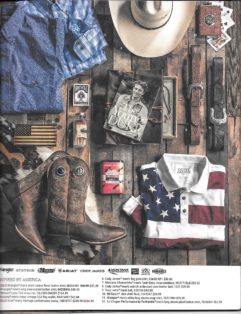The Posse After Tiburcio Vasquez
Enter to win a copy of
The Principles of Posse Management:
Lessons from the Old West for Today’s Leaders.
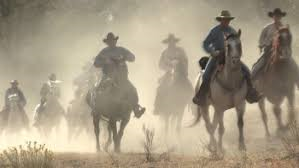
A light, frigid rain tapped the dirty windows of a small store located along the banks of the San Joaquin River near the town of Millerton, California. A half dozen ferryboat operators were inside soaking up the warmth emanating from a fireplace. Four of them were huddled around a table playing cards; the other two were enjoying a drink at a makeshift bar, while an unkempt clerk arranged a row of canned goods across a warped shelf.
The clerk was entertaining the preoccupied men in the room with a song when the shop door swung open. He was the last to notice the figures standing in the entranceway. He looked up from his work after being conscious of his own loud voice in the sudden silence. He slowly turned to see what everyone else was staring at.
The outlaw Tiburcio Vasquez entered the store with his pistol drawn. Three other desperadoes, all brandishing weapons, followed closely behind. Vasquez, a handsome man of medium height with large, dark eyes, surveyed the terrified faces of the patrons as he smoothed down his black mustache and goatee. “Put up your hands,” he ordered the men. The clerk quickly complied, and the others reluctantly did the same.
Two more of Vasquez’s men burst into the store through the back entrance and leveled their guns on the strangers before them.
“You don’t need a gun here,” the clerk tried to reason with the bandits. Vasquez grinned as he walked over to the man.
“Yes, I do,” he said as he placed his gun against the clerk’s temple. “It helps quiet my nerves.”
Vasquez demanded the men drop to the floor, facedown. After they had complied, their hands and feet were tied behind them. One of the men cursed the desperadoes as he struggled to free himself. “You damned bastard,” he shouted at Vasquez. “If I had my six-shooter I’d show you whether I’d lie down or not.”
The bandits laughed at the outburst and proceeded to rob the store and its occupants of $2,300. The November 10, 1873, holdup was one of more than one hundred such raids perpetrated by the thirty-eight-year-old Mexican and his band of cutthroat thieves and murderers in their violent careers. The desperadoes escaped the scene of the crime, eluding authorities for several months before they were caught.
Prior to the Gold Rush, California’s population was composed primarily of the original Spanish and Mexican settlers and indigenous Native Americans. News of the riches found in the foothills of the territory loosed a flood of white settlers into the area. In the pioneers’ quest to tame the Wild West and transform the fertile California frontier into a “civilized” state, native Californians were forced into a new way of life. Families like Tiburcio Vasquez’s harbored a great deal of animosity toward the white miners and businessmen who demanded the original residents conform to their laws and way of living. Vasquez resented such treatment and from an early age began rebelling against what he called the “gringo’s” influence.
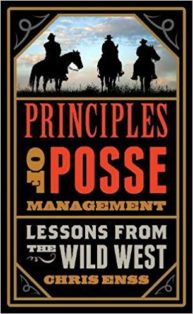
To learn more about the great posses of the frontier read
The Principles of Posse Management:
Lessons from Old West for Today’s Leaders.
This Day…
The Posse After James Kenedy
Enter to win a copy of
The Principles of Posse Management:
Lessons from the Old West for Today’s Leaders.

Dora Hand was in a deep sleep. Her bare legs were draped across the thick blankets covering her delicate form, and a mass of long, auburn hair stretched over the pillow under her head and dangled off the top of a flimsy mattress. Her breathing was slow and effortless. A framed, graphite-charcoal portrait of an elderly couple hung above the bed on faded, satin-ribbon wallpaper and kept company with her slumber.
The air outside the window was still and cold. The distant sound of voices, backslapping laughter, profanity, and a piano’s tinny, repetitious melody wafted down Dodge City’s main thoroughfare and snuck into the small room where Dora was sleeping.
Dodge was an all-night town. Walkers and loungers kept the streets and saloons busy. Residents learned to sleep through the giggling, growling, and gunplay of the cowboy consumers and their paramours for hire. Dora was accustomed to the nightly frivolity and clatter. Her dreams were seldom disturbed by the commotion.
All at once the hard thud of a pair of bullets charging through the door and wall of the tiny room cut through the routine noises of the cattle town with uneven, gusty violence. The first bullet was halted by the dense plaster partition leading into the bed chambers. The second struck Dora on the right side under her arm. There was no time for her to object to the injury, no moment for her to cry out or recoil in pain. The slug killed her instantly.
In the near distance, a horse squealed, and its galloping hooves echoed off the dusty street and faded away.
A pool of blood poured out of Dora’s fatal wound, turning the white sheets she rested on to crimson. A clock sitting on a nightstand next to the lifeless body ticked on steadily and mercilessly. It was 4:15 in the morning on October 4, 1878, and for the moment nothing but the persistent moonlight filtering into the scene through a closed window marked the thirty-four-year-old woman’s passing.
Twenty-four hours prior to Dora’s being gunned down in her sleep, she had been on stage at the Alhambra Saloon and Gambling House. She was a stunning woman whose wholesome voice and exquisite features had charmed audiences from Abilene to Austin. She regaled love-starved wranglers and rough riders at stage and railroad stops with her heartfelt rendition of the popular ballads “Blessed Be the Ties That Bind” and “Because I Love You So.”
Adoring fans referred to her as the “nightingale of the frontier,” and admirers continually competed for her attention. More times than not, pistols were used to settle arguments about who would be escorting Dora back to her place at the end of the evening. Local newspapers claimed her talent and beauty “caused more gunfights than any other woman in all the West.”
Dora arrived in Dodge City in June of 1878. Several of the city’s residents who knew the songstress was on her way were eagerly anticipating her arrival. Among them was the mayor of Dodge City, James Kelley. Mayor Kelley had made Dora’s acquaintance at Camp Supply. He was smitten with her, and the pair became romantically involved shortly after she stepped off the stage in Dodge.

To learn more about the great posses of the frontier read
The Principles of Posse Management:
Lessons from Old West for Today’s Leaders.
The Young Duke
This Day…
1868 “Decoration Day”, later called Memorial Day is first observed in Northern US states.
The Posse After Bronco Bill Walters
Enter to win a copy of
The Principles of Posse Management:
Lessons from the Old West for Today’s Leaders.
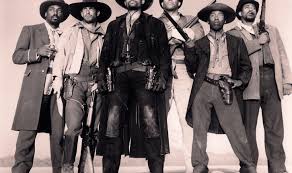
Five riders moved swiftly across the open country through Granite Pass in southwest New Mexico. An electrical storm lit up the sky around them, and a deluge of hail broke free from the clouds, pelting the men in their saddles and their horses. Sounding like a troop of demons advancing, the wind howled and screamed as it pushed over the massive walls of rock the riders passed.
Former peace officer Jefferson Davis Milton rode in front of the others. He was a tall man with sloping shoulders, his granite like visage partly hidden by a dark mustache that curled around to meet his thick sideburns. George W. Scarborough, a blue-eyed, gruff-looking, one time law man from El Paso, Texas, took a position on Jeff’s left. Eugene Thacker, a youthful son of a railroad detective, rode on Jeff’s right side. Directly behind the three were Bill Martin and Thomas Bennett, Diamond A ranch cowboys turned bounty hunters. The men pulled their slickers around their necks and urged their mounts on through the tempest. Claps of thunder ushered in another downpour of hail.
The determined riders, members of a posse pursuing a gang of train robbing outlaws, were soaked to the bone once they reached Fort Apache, a military post near Coolidge Lake. No one said a word as they made camp outside the garrison’s gates. Discussing the obstacles on the way to achieving that goal wasn’t necessary. Their focus was on capturing Bronco Bill Walters and his boys.
William E. Walters, also known as Bronco Bill Walters, was from Fort Sill, Oklahoma. What he did before being hired at the Diamond A ranch in 1899 is anyone’s guess. It’s what he did after getting a job as a cowhand that warranted attention. The Diamond A was a five hundred square mile spread nestled in the boot heel of New Mexico. The magnificent acres of grass there made it the perfect spot for raising cattle. The ranch was always in need of workers. Cowpunchers that dropped by looking for employment were generally hired on the spot. It was considered a rude violation of the proprieties of a cow camp to inquire into a man’s connections or character. Just wanting to work was enough. Bronco Bill Walters wanted to work, and that’s all that mattered and all the foreman at the Diamond A would have cared about if Bronco Bill hadn’t have desired more than the job had to offer.

To learn more about the great posses of the frontier read
The Principles of Posse Management:
Lessons from Old West for Today’s Leaders.
According to Kate
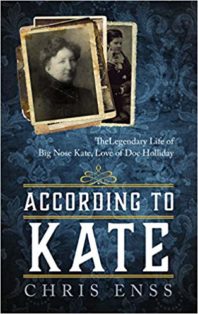
Doc Holliday’s paramour Big Nose Kate could never get a publisher to give her the big bucks she demanded to tell the story of her life, but that didn’t mean she didn’t collect material she wanted to use in a biography. Over the fifty years Mary Kate Cummings, alias Big Nose Kate, traversed the West she saved letters from her family, musings she had written about her love interests, and life with the notorious John Henry Holliday. Using rare, never before published material Big Nose Kate stock-piled in anticipation of writing the tale of her days on the Wild Frontier, the definitive book about the famous soiled dove will finally be told.
Kate claims to have witnessed the Gunfight at the OK Corral and exchanged words with the likes of Wyatt Earp and Josephine Marcus. There’s no doubt she embellished her adventures, but that doesn’t take away from their historical importance. She was a controversial figure in a rough and rowdy territory. What she witnessed, the lifestyle she led, and the influential western people she met are fascinating and represent a time period much romanticized.
This Day…
The Posse After Tiburcio Vasquez
Enter to win a copy of
The Principles of Posse Management:
Lessons from the Old West for Today’s Leaders.
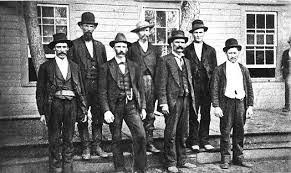
A light, frigid rain tapped the dirty windows of a small store located along the banks of the San Joaquin River near the town of Millerton, California. A half dozen ferryboat operators were inside soaking up the warmth emanating from a fireplace. Four of them were huddled around a table playing cards; the other two were enjoying a drink at a makeshift bar, while an unkempt clerk arranged a row of canned goods across a warped shelf.
The clerk was entertaining the preoccupied men in the room with a song when the shop door swung open. He was the last to notice the figures standing in the entranceway. He looked up from his work after being conscious of his own loud voice in the sudden silence. He slowly turned to see what everyone else was staring at.
The outlaw Tiburcio Vasquez entered the store with his pistol drawn. Three other desperadoes, all brandishing weapons, followed closely behind. Vasquez, a handsome man of medium height with large, dark eyes, surveyed the terrified faces of the patrons as he smoothed down his black mustache and goatee. “Put up your hands,” he ordered the men. The clerk quickly complied, and the others reluctantly did the same.
Two more of Vasquez’s men burst into the store through the back entrance and leveled their guns on the strangers before them.
“You don’t need a gun here,” the clerk tried to reason with the bandits. Vasquez grinned as he walked over to the man.
“Yes, I do,” he said as he placed his gun against the clerk’s temple. “It helps quiet my nerves.”
Vasquez demanded the men drop to the floor, facedown. After they had complied, their hands and feet were tied behind them. One of the men cursed the desperadoes as he struggled to free himself. “You damned bastard,” he shouted at Vasquez. “If I had my six-shooter I’d show you whether I’d lie down or not.”
The bandits laughed at the outburst and proceeded to rob the store and its occupants of $2,300. The November 10, 1873, holdup was one of more than one hundred such raids perpetrated by the thirty-eight-year-old Mexican and his band of cutthroat thieves and murderers in their violent careers. The desperadoes escaped the scene of the crime, eluding authorities for several months before they were caught.

To learn more about the great posses of the frontier read
The Principles of Posse Management:
Lessons from Old West for Today’s Leaders.

